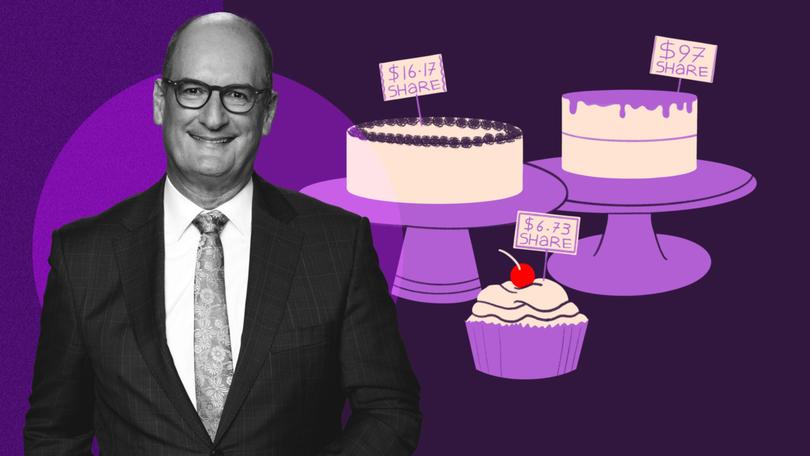David Koch: Why the share market’s record high has me worried
DAVID KOCH: Have we hit peak greed? I have seen enough share market crashes to be spooked in these situations.

Earlier this month the Australian share market touched a record high. And, frankly, I was nervous.
Was it “peak greed” — when markets were getting too hot on the back of irrational optimism?
On Wednesday, the International Monetary Fund shared my uncertainty.
Sign up to The Nightly's newsletters.
Get the first look at the digital newspaper, curated daily stories and breaking headlines delivered to your inbox.
By continuing you agree to our Terms and Privacy Policy.I’m old enough to have seen enough share market crashes to be spooked in these situations. In the two weeks since that record high, the market has contracted a dose of the wobbles on the back of Iran’s decision to get involved in the Israel/Gaza conflict plus uncertainty about whether US interest rates will fall by as much and as quickly as expected.
That share market euphoria of just two weeks ago has taken a more sobering tone.
The IMF has warned that the downward trend in inflation looks to have stalled which means those expected rate cuts in the US and Australia will be stalled as well.
The IMF is warning asset prices will fall because of a disconnect between markets and economic fundamentals. When they talk asset prices they mean share and property values. And the IMF is warning of a major correction.
The world’s most prominent investor, Warren Buffett, once said “be fearful when others are greedy and be greedy only when others are fearful”.
The rationale is that when others are greedy, prices for investments typically boil over and investors should be cautious as they are likely overpaying for an asset. Buying at the top of the market usually leads to poor future returns as values inevitably pull back and readjust to a normal valuation.
But at the bottom of the cycle, “peak fear”, is when investments are massively undervalued and underappreciated by investors. As Warren Buffet said in his biography, Snowball: “cash combined with courage in a crisis is priceless”.

Remember investment markets move in cycles. Every boom will end in a bust and every bust will end in a recovery. The timing of these movements is the unknown as markets are driven by the emotions and psychology of those people operating in them.
So, is this current market “wobble” a precursor to a more imminent major downward correction? If so, should we be trimming our share investments in anticipation of a correction in values?
It’s a question I put to a range of market analysts over the past two weeks. Most agreed that, at these levels, you could conclude we are at peak greed. But there were differing views at what investors should be doing.
Some pointed out “extreme greed” could last a while. In other words, when extreme greed is reached it often stays there for a while and does not pull back immediately.
Others said it is a time to be wary rather than panic and sell out too early. They said watch your portfolio carefully and act quickly if there is a major correction.
While another school of thought is that no one can pick the perfect time to buy or sell. So, if an investment has performed well there is no harm in trimming your holding (defined as selling 20-30 per cent of your holding) and taking some profits.
The higher the market goes, the more vulnerable to a correction it becomes.
This surge in markets is being led by big US technology companies (like Microsoft, Meta, Google and Nvidia) which are all riding the artificial intelligence boom. Unlike previous technology booms, these companies are generating profits that justify their lofty share price levels.
And history tells us that, ever since the Great Depression, in the year of a US presidential election where an incumbent has run again (like Biden), the share market has risen strongly.
So there are reasons for people, like me, to stop worrying. But we’re only human and we all have an interest in equities through our superannuation funds which have become the second biggest asset of most Australians behind their house.
Most superannuation funds offer investors a range of investment options from high-risk international funds through to very conservative balanced and capital-stable. Now is a good time to check which options you’re invested in and whether they reflect your risk profile.
If they look a bit risky, and overexposed to shares in relation to your individual circumstances, chat with the fund and your adviser about rebalancing.
While super fund returns will be hit by a share market downturn, remember it won’t be as bad because most fund managers have a diverse portfolio across property and fixed interest as well.
Advisers also say those who are salary sacrificing into superannuation should think about continuing as normal. If you’re contributing the same amount each month, today’s contribution will buy more than last month’s. It’s the same effect as dollar-cost-averaging.
When I chatted to my mates at investment newsletter, Marcus Today, their advice for share investors at this stage of the cycle was:
- Do nothing yet. Enjoy the ride.
- Don’t sell anything until it starts (the best bits are the frothy bits). Don’t miss them by being pious about “value” — this is about exploiting the herd not assessing value.
- Don’t buy anything up here.
- Don’t predict the top ahead of time.
- When it does start, do something. Make a decision. Even if you’re wrong to sell your only risk is not making money. I think you can handle that.
